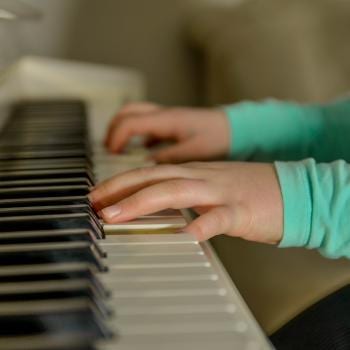I was sitting on the couch reading when I heard a sudden altercation in front of me, a yelp, and then Bobby was crying.
“Sally, do you need to apologize?” I asked. I immediately regretted the question—I should have first asked what happened rather than jumping to conclusions. I’m not perfect. But Sally’s response was immediate.
“Yes mom, I do,” she said genuinely.
“What happened?” I asked. By this time I was holding Bobby on my lap, stroking his hair and trying to soothe him. He was still crying, but was starting to calm down.
“Bobby threw a train at me, and it hit me in the belly, and I didn’t like it,” she told me. “So I threw it back at him and it hit him in the head.”
“Okay,” I said. “Bobby, Sally has something she wants to tell you.”
“I am so, so sorry Bobby,” Sally said earnestly.
“Bobby, you also threw a train at Sally. Can you say sorry too?”
“Sorry, Sally,” Bobby said haltingly, finally pulling himself together.
The apologies out of the way, Sally and I had a conversation about what she should do if her brother hurts her, whether intentionally or not. Sally said one option was just moving away—going to another room, for instance—but pointed out that her brother might follow her (as he often does). I suggested she could talk to him, telling him that it hurt when he threw the train (or what have you) and asking him to stop. She found this idea interesting and was enthusiastic, but added that if he didn’t listen to her she would go to me or her dad about it. I agreed, and told her we were always ready to step in and help if there was a problem.
What struck me about this incident was that Sally’s honesty about her need to apologize did not stem from fear of punishment. Punishment is very rare in our home, as we have found that most wrongdoing can be handled more effectively (and positively) without it. In this case, Sally prompted her apology.
Ever since Sally was little, we have sought to foster her natural sense of empathy. We encourage her to consider others and to think about how her actions affect others. When her desires conflict with those of her brother, or with those of her father or I, we encourage her to consider others’ needs in addition to her own. With both of our children, Sean and I put more importance on teaching empathy than on teaching obedience.
This situation would have played out very differently had it happened when I was a child. My parents were strict and placed a primacy on teaching obedience to authority. Had I hurt one of my younger brothers, my parents would have spanked me and then required me to apologize (on threat of another spanking). There would have been no conversation, only a lecture.
How does the lesson learned from a spanking and a lecture differ from the lesson learned from empathy and a conversation? There are some similarities on the surface—both involve an apology and both involve learning something. But the reasons behind the apology and the things that are learned differ. When I was a child, apologies were forced on pain of spanking, and I well remember making apologies I didn’t mean. In fact, if my memory serves, my apologies were more likely to be motivated by threat of punishment than they were to be genuine. In contrast, Sally’s apology was completely genuine.
I am of the opinion that apologies should never be forced. Some readers may note that my immediate reaction to the altercation was to ask Sally if she needed to apologize. This is partly because I’m still working on unlearning old habits. Today I try to think of apologies as a way to restore a broken relationship rather than as the forced ritual I grew up with. The restoration of a broken relationship isn’t something that can be forced. It has to be voluntary. When a child refuses to apologize right away, I have found that they often just need some space. The apology—and the restored relationship—may simply take a little bit of time. This is one area where I am still growing—unlearning old patterns is hard.
Growing up, the lesson I tended to learn when I got in trouble was that I better not do X or else I would be spanked. That is what generally stuck with me. We’re doing things differently with Sally, and hoping that offering positive tools and providing skills will mean the lessons she learns are both more immediately helpful and useful longterm.
I should note that we are also teaching Bobby not to throw things (or hit people). We do this by teaching empathy—when he hits someone or throws something at them, we point out the harm caused and show him how to touch others gently—and by dealing with whatever caused his frustration and showing him better ways to express it or work through it—small children rarely throw things or hit people for no reason. This particular situation didn’t offer a good opportunity for going over these things with Bobby, though, because the pain and tears associated with being hit in head with a toy train took his mind away from the original act.















